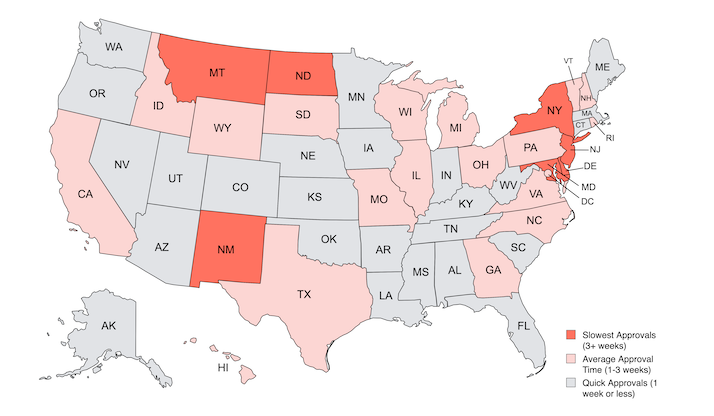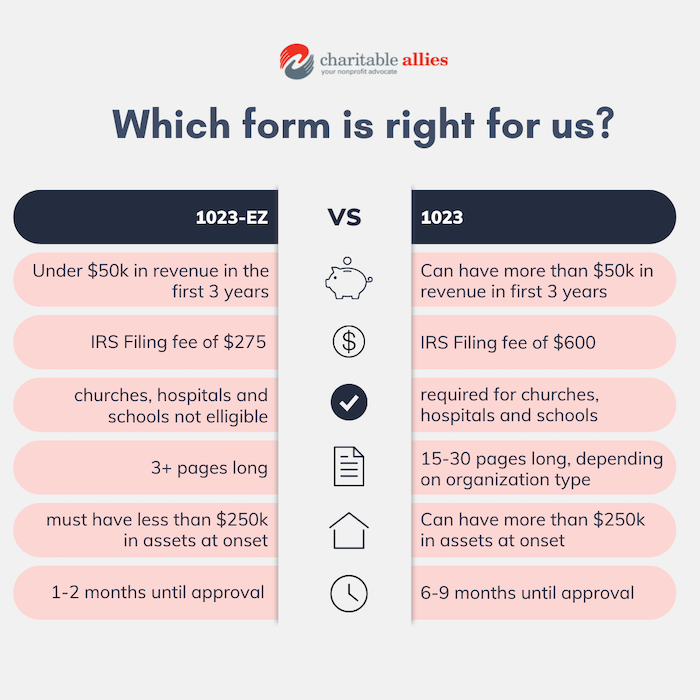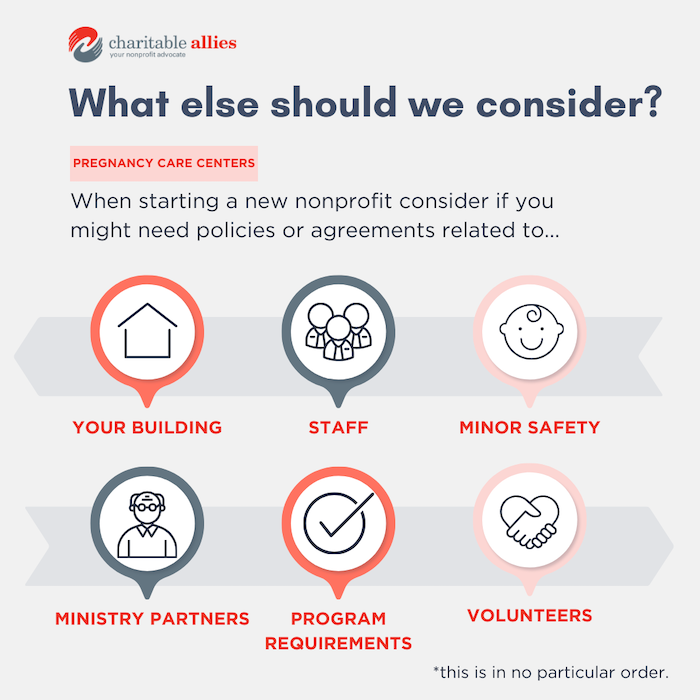
If you’re looking to start a pregnancy care center (also called crisis pregnancy center, pregnancy care clinic, pregnancy center or pregnancy help center) to serve mothers and children, this is the article for you. Our nonprofit attorneys detail the steps to getting the legal paperwork started below. If you would like our legal team to help you start your pregnancy center, please request a free consultation. Our comprehensive startup packages start at $1600. We are happy to discuss pricing, timeline and the steps in further detail.
If you are starting a pregnancy care center affiliated with an existing ministry or pro-life organization, reach out to the organization first to ensure your new nonprofit will meet their requirements to be affiliated. Often, it’s as simple as contacting the organization to gain permission to use their name or branded materials. They can often help connect you with local resources to help get you started on the right track. Before you start on legal paperwork, it’s also wise to reach out to your state’s coalition of pregnancy centers for support and information.
What should I prepare when starting a Pregnancy Care Center?
If you want to start a pregnancy care center or clinic, you’ll need to know a few things like:
- Which state will your organization be located in?
- What will the mission of your organization be?
- What services will you provide? Will you provide ultrasounds? Parenting classes? Education on STIs? Education on adoption? Resources for single mothers? Think about how you’d like to serve the families in your area with your new organization.
- Will your organization be a medically licensed facility or not? If so, research the requirements in your state for becoming medically licensed. Typically, medically licensed facilities are those that provide medical services like ultrasounds. Pregnancy care centers that are not medically licensed can’t provide medical services, but can provide services like parenting classes, free baby clothes, or peer support groups.
- Will you be an independent organization or will you be associated with a local church or ministry? Or will you be associated with a national pro-life nonprofit organization?
- Are there any other pregnancy care centers in the area? If you’re not sure, you can check here.
- Is there a local or state coalition of pregnancy centers who might be able to help set up the organization or offer advice?
Board Members
Another thing you’ll need in order to get started is board members. Typically, you’ll need at least 3 people (including yourself) to serve on the initial board of directors for the nonprofit. The most important thing about your initial board members is that they are passionate about helping women and children like you are! Keep in mind, a board cannot be made up entirely of people from the same family. Your first board won’t be perfect, but as long as you have at least three people who are not related by blood, marriage, or business partnership, you’re good to go.
There are also different board officer roles like Board Chair or Secretary that come with extra responsibilities and permissions. Some states allow one person to hold more than one board officer role, while others do not. Often on the initial board, the first three board members also hold the three initially required board officer roles: President, Secretary and Treasurer. Once you know your location, mission and your board members, it’s time to get started with the paperwork. Starting a nonprofit does have costs associated with the process including governmental filing fees, which we’ll cover below so you know what to expect.
How to Start a Pregnancy Care Center Step One: Incorporating in Your State
Incorporation is the first step to getting started with the legal process of officially becoming a nonprofit organization. You need to be incorporated in your state in order to do crucial things like open a bank account for the organization so you can start accepting donations.
Some states call this incorporation document the “Articles of Incorporation,” while others will call it “Certificate of Formation” or something similar. There are three important things of note in this step:
- Make sure your “statement of purpose” (sometimes called purpose language) accurately reflects that the center is being organized for charitable purposes. It’s key that the language you use in this document is in-line with language your state authority and the IRS recognize as charitable.
- State waiting times vary wildly. We’ve categorized all 50 states below to give you an idea of their general timeline, but sometimes factors like being short staffed or having more registrations to review will cause longer wait times.
- Every state charges a fee to file the Articles of Incorporation. This can vary from as little as $8 to a few hundred dollars, especially if you opt for faster processing.
How long will it take for my Pregnancy Center’s Articles of Incorporation to be Approved?

Waiting times vary. Many states will list how long the wait times are on the website of the governmental body that reviews the documents, which could be a Secretary of State or Division of Corporations. Some states have an extra fee you can pay to further expedite your applications, but not all states offer this option. Again, state wait times vary, but we’ve created categories that are accurate in our experience with each state. Note that these processing times are for online submissions, not for submitting paperwork via mail or fax. In our experience, mail and fax increase the wait times in almost every state that allows either option.
Quickest Approval Time States (Approvals in 1 week or less): Alabama, Alaska, Arkansas, Colorado, Connecticut, Florida, Indiana, Iowa, Kansas, Kentucky, Louisiana, Maine, Massachusetts, Minnesota, Mississippi, Nebraska, Nevada, Oklahoma, Oregon, South Carolina, Tennessee, Utah, Washington, West Virginia
Average Approval Time States (Approvals in 1-3 weeks): California, Washington D.C., Georgia, Hawaii, Idaho, Illinois, Michigan, Missouri, New Hampshire, North Carolina, Ohio, Pennsylvania, Rhode Island, South Dakota, Texas, Vermont, Virginia, Wisconsin, Wyoming
Slowest Approval Time States (Approvals taking more than 3 weeks): Delaware, Maryland, Montana, New Jersey, New Mexico, New York, North Dakota
States that Offer Expedited Service for an Extra Fee: California, Connecticut, Washington D.C., Delaware, Florida, Georgia, Hawaii, Idaho, Illinois, Kansas, Louisiana, Maine, Maryland, Michigan, Nevada, New Jersey, New York, North Carolina, South Dakota, Wisconsin
What Kind of Information is Typically in Articles of Incorporation?
- Name of the organization.
- Address.
- Charitable purpose of the organization.
- Contact information and mailing information for the person who will be the registered agent.
These are the pieces of information we see most frequently, but each state is a little different. Some states even have requirements and rules around what you are allowed to name the organization. Some states require a “wet signature” with a pen rather than an e-signature on the document. We’re familiar with the rules and regulations with each state’s Articles of Incorporation or similar document, so if you’d like a legal team to complete the form for you, let us know! We have plenty of experience establishing nonprofit organizations that care for mothers and children.
How to Start a Pregnancy Care Center Step Two: Creating Bylaws and Other Corporate Documents
While your state is reviewing your Articles of Incorporation, the next step is to create corporate documents for the pregnancy care center, including Bylaws and a Conflict of Interest Policy.
Bylaws
Bylaws are the rules that govern how your nonprofit runs. This could include:
- When your fiscal year starts (most use January so their fiscal year is the calendar year)
- How the board is run, including how long board members will serve on the board, how often they meet, and how to remove a board member
- The duties of each board officer, including Treasurer, Board Chair (sometimes called Board President) and Secretary
Your board will need to approve and officially adopt the bylaws at your 1st board meeting.
Conflict of Interest Policy and EIN
The Conflict of Interest policy outlines what a conflict of interest is, how to determine if there is a conflict of interest present, and how to address it. Ideally, the conflict of interest policy is clear enough in defining the proper terms that you can identify potential conflicts easily. If a conflict is identified, the document will walk through the proper procedure to handle it to ensure the organization’s tax exempt status isn’t being put at risk. For example, let’s say a member of your board owns a boutique that sells baby clothes. Is the nonprofit allowed to buy clothes from that boutique to give to families in need? The answer isn’t always yes, but it isn’t always no either. The conflict of interest policy ensures your nonprofit stays in-line with the IRS requirements for nonprofits by helping you navigate those situations properly.
You’ll also want to file for an EIN at this point. An EIN is a number the IRS attaches to your pregnancy care center similarly to how a social security number is attached to an individual. The EIN allows the nonprofit to properly accomplish financial things legally like hiring an employee or opening a bank account to hold donations. There is no fee to obtain an EIN and it is a filing with the IRS rather than a filing with your state. The EIN will also need to be on every donation acknowledgement you send when your nonprofit starts getting donations.
How to Start a Pregnancy Care Center Step Three: Filing IRS form 1023 for 501(c)(3) status

Next, you’ll want to get 501(c)(3) status for your pregnancy resource center. This is a kind of tax exempt status determined by the IRS. This step is also called “getting your determination letter.” A determination letter is an official document from the IRS that confirms your organization is a tax exempt, 501(c)(3) organization. Often, vendors, donors and potential grant funders will ask for this letter as proof that your organization is a legitimate charitable organization. Many companies offer nonprofit discounts, but in order to obtain them, you’ll often need to show your determination letter as proof of tax exemption.
Form 1023 and Form 1023-EZ
To gain 501c3 status, there are two possible forms your pro-life organization could potentially complete: Form 1023 or Form 1023-EZ. Essentially, these are two different versions of the same form. The IRS has different qualifications for which types of organizations are allowed to file each form.
If you’re anticipating your pregnancy care center could bring in $50,000 or less in revenue each year in your first three years of operation, you could be eligible for Form 1023-EZ, which is a shorter, less expensive version of the form. Typically, the IRS takes 1-2 months to approve applications using Form 1023-EZ. The filing fee is $275.
If you already have funding lined up that is more than $50,000, you’ll need to file Form 1023. IRS Form 1023 can be overwhelming for those who are new to the process of filing it. The form includes detailed, narrative answers, a financial section, and multiple attachments. The IRS looks for certain language and information within the 1023 to ensure that your activities are charitable. Typically, approval takes anywhere between 6-9 months. The IRS regularly updates the wait times on their website. Sometimes, the IRS will come back to you with questions about your application, which can make the process take longer. Be wary of any service guaranteeing immediate approval of Form 1023. The IRS processing times are dependent upon multiple factors, including their workload, staffing, etc. The filing fee is $600.
If the prospect of filling out mountains of IRS paperwork sounds a little overwhelming, reach out to us and we’re happy to complete and file the paperwork for your pregnancy care center. We’ve helped hundreds of clinics, family support centers and other nonprofits get their tax exempt status nationwide.
What else should I consider when starting a Pregnancy Care Center?
Every state is a little different when it comes to how it regulates nonprofits, especially those providing any sort of medical care. Keep in mind, STI testing or pregnancy tests are deemed medical care in many states. In some states, there are regulations around what you’re allowed to name your organization and the language you use to describe it, depending on if you have licensed medical staff and which medical services you provide. Be sure to take this into account and look into your state’s rules and regulations. Connecting with your state coalition of pregnancy centers can also be helpful in learning more about how your state handles pregnancy centers. If you’re going to handle STI testing or any other sort of medical testing, it’s also important to have a written agreement with a properly licensed lab to process those tests.
Because pregnancy centers of all kinds handle delicate situations regularly, we also suggest having an internal document that provides language for the staff and volunteers to help them navigate difficult or emotional situations with care and tact. This kind of document can help ensure your staff and volunteers are on the same page, and it can also protect the organization from liability, especially in states that are not friendly to your cause. A volunteer manual and agreement, and an employee manual can be great places to put this information, but also be sure to provide training as well.

Fundraising
You’ll want to check NASCO’s list to see if your state requires you to register to fundraise. This registration is called Charitable Solicitation Registration and most states require it in order to start fundraising for your organization. Fundraising includes asking friends, family and community members for donations, as well as holding any sort of event where people are asked to give financially. Fundraising also often includes online activities like Facebook fundraisers. Some states allow you to complete your CSR requirements before you get your determination letter and others do not.
Any donations you accept between the day you incorporate and the day you get your determination letter will still be tax deductible as long as the time between when you incorporate and when you get your determination letter is less than 27 months. This is sometimes called the 27 month rule. So if you receive donations before getting your determination letter from the IRS, keep track of them! You’ll need to send donation acknowledgements that include all the necessary information like your EIN, the amount of the donation, and date of the donation.
Other Considerations
Some states require extra forms to obtain property tax exemption or sales tax exemption. We’re happy to help with these forms as well.
Each nonprofit is a little different and your needs will depend on things like what state you’re in and what services you provide. For example, if you have volunteers working with infants or children, it’s a wise choice to have a volunteer agreement. And you’ll want to background check your volunteers to ensure parents feel safe allowing their children to attend. Safety policies can also help ensure the wellbeing of participants, volunteers and staff. If you have another organization or ministry you partner with, you might want an agreement in place to make the professional relationship official and outline the details.
If you are looking to start a pregnancy care center and would like someone to draft the legal paperwork for you, reach out to us for a free consultation. Our compassionate team is here to help.

